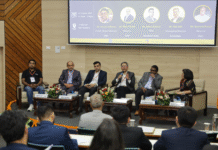— 66 per cent CEOs in India compared to 86 per cent CEOs globally anticipate a recession over the next 12 months, with more than half (CEOs in India and global) expecting it to be mild and short
— 62 per cent CEOs in India compared to 73 per cent CEOs globally believe a recession will upend anticipated growth
— 79 per cent CEOs in India and globally expect their organisation’s headcount to increase over the next three years
Banhgalore, 17 October 2022– The KPMG 2022 India CEO Outlook which asked more than 125 CEOs in India about their strategies and outlook, reveals that 58 per cent of leaders in India as well as globally expect a recession to be mild and short. Pandemic fatigue, economic factors- including the threat of rising interest rates, inflation and anticipated recession and reputational risk, top the list of most pressing concerns for CEOs in India today.
Over the next year, 66 per cent CEOs in India compared to 86 per cent globally anticipate a recession to hit, with 86 per cent CEOs in India compared to 71 percent CEOs globally predicting it will impact company earnings by up to 10 percent. 62 per cent CEOs in India compared to 73 per cent globally believe that a recession will upend anticipated growth.
Senior executives in India as well as globally also feel markedly more confident about the resilience of the global economy over the next six months (82 per cent CEOs in India compared to 73 percent CEOs globally) than they did in February 2022 (40 percent CEOs in India compared 60 per cent CEOs globally), when KPMG surveyed 500 CEOs for its CEO Outlook Pulse survey. Further, 57 per cent CEOs in India are confident about the global economy’s growth prospects over the next three years (up from 52 per cent in February 2022) and nearly 72 per cent CEOs in India are confident about their organization’s growth over the next three years.
Sharing his views, Yezdi Nagporewalla, CEO, KPMG in India, said “Be it the business ecosystem, or supply chain or issues pertaining to talent, the magnitude of these challenges has altered dramatically and what matters is how agile business leaders are to respond. CEOs in India surveyed appear confident in their organisation’s resilience, they also seem to have prepared themselves to make the most of the current environment, brought on by the promise of technology, talent and ESG.”
“With the increasing pace of change and transformation, CEOs in India have accepted and adapted to the current needs of the modern workforce. It is indeed, heartening to note that CEOs in India are looking to increase measurement and governance to build a more robust and transparent approach towards driving a long-term ESG agenda” he added
Additional Findings :
Anticipated recession driving talent freezes
- With continued economic turmoil, there are signs the Great Resignation could be cooling down, with 33 per cent CEOs in India compared to 39 percent of CEOs globally having already implemented a hiring freeze, and 47 per cent CEOs in India compared to 46 percent CEOs globally considering downsizing their workforce over the next six months.
- But when CEOs take a longer-term view, 79 per cent CEOs in India and globally expect their organisation’s headcount to increase over the next three years
Uncertainty fueling long-term digital transformation
- The current uncertainty is driving CEOs in India to continue to prioritize digital transformation with 61 per cent CEOs in India compared to 72 per cent CEOs globally agreeing they have an aggressive digital investment strategy, intended to secure first-mover or fast-follower status
- In the longer-term, little less than a quarter (23 per cent) CEOs in India believe that advancing digitalization and business connectivity is also vital to achieving growth objectives over the next three years. 57 per cent CEOs in India also agree that their organization’s digital and ESG strategic investments are inextricably linked.
- The anticipated recession may also be pushing businesses to reconsider their strategies. 50 per cent CEOs in India compared to 37 per cent CEOs globally plan to pause or reduce their digital transformation strategy in the next six months. 28 per cent CEOs in India compared to 40 per cent CEOs globally have already paused or reduced their digital transformation strategies
- Also Read: UNDP partners with Arya.ag and Friends of Women’s World Banking to improve incomes of 10,000 households
Evolving focus toward reputational and technological risks
- Emerging/disruptive technology has landed as the top risk to organisational growth over the next three years for both CEOs in India as well as globally. In addition, CEOs in India have identified several other areas as top risks to growth: return to territorialism and supply chain, regulatory and environmental and climate change
- Pandemic fatigue, economic factors- including the threat of rising interest rates, inflation and anticipated recession and reputational risk top the list of most pressing concerns for CEOs in India today.
Cyber security still a strategic function for CEOs in India
- While other risks may now feature as top concerns for CEOs in India as well as globally, the cyber environment is evolving quickly, with 66 per cent CEOs in India compared to 77 per cent globally seeing information security as a strategic function and a potential competitive advantage.
- 70 per cent CEOs in India compared to 78 per cent CEOs globally view cyber strategy as critical to engender trust with their key stakeholders.
- Geopolitical uncertainty is increasing worries over corporate cyber attacks for as many as 73 per cent CEOs globally. In comparison only 54 per cent CEOs in India view this as a concern. But that is not to say they are not taking precautions. In fact, 60 per cent CEOs in India compared to 76 per cent CEOs globally say that protecting their partner ecosystem and supply chain is just as important as building their own organisation’s cyber defences
Stakeholder pressure increasing accountability in ESG
- Half of the CEOs in India (50 per cent) say their organizations struggle to articulate a compelling ESG story. Nearly 62 per cent respondents in India also believe that stakeholder scrutiny of ESG issues — gender equality, climate impacts etc. — will continue to accelerate
- CEOs in India recognize the importance of ESG initiatives to their businesses, especially when it comes to improving financial performance and driving growth. In fact, 77 per cent CEOs in India see stakeholder demand for increased reporting and transparency on ESG issues. This is up a significant extent (up from 42 per cent in August 2021)
Visit EasyShiksha for skill development courses






































































